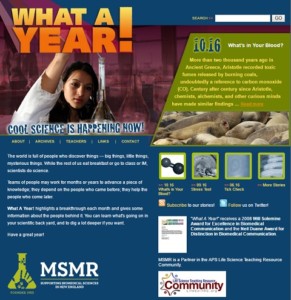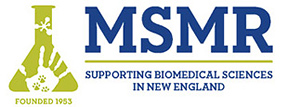Please join us for Biomedical Research Day 2019
All MSMR members are cordially invited to join us for our 2019 Biomedical Research Day honors program, which will be held at the Union Club of Boston on Friday, Oct. 25. Register here. We look forward to seeing you at Biomedical Research Day.
Love, Care, Progress!
Our friends at Americans for Medical Progress recently premiered “Love, Care, Progress!,” a new video highlighting the importance of animals in research and the high standards of care they receive. In it, research professionals – including a trainer, scientist, animal behaviorist, surgical manager and veterinarian – talk about caring for the animals in [...]
Fancy Footwear
According to evolutionary biologists, humans have been running for about two million years. For most of this time, running was essential to human survival activities like hunting, warfare, and fleeing danger produced better outcomes at a faster pace. It is only in the last few hundred years that running has become a recreational [...]

THURSDAY, APRIL 26, 2018
BOSTON PARK PLAZA HOTEL
50 PARK PLAZA AT ARLINGTON STREET,
BOSTON, MA 02116-3912
12:30 PM REGISTRATION
Workshops begin at 1:00 pm and end at 5:00 pm
CLICK HERE FOR THURSDAY AGENDA
POSTER COMPETITION
2018 MSMR ENRICHMENT SYMPOSIUM POSTER COMPETITION
APRIL 27, 2018
BOSTON PARK PLAZA
50 PARK PLAZA at ARLINGTON STREET
Boston, MA
Subject: We are seeking colorful and informative posters covering aspects of enrichment used with any laboratory animal species. Accepted posters will be displayed at the TENTH Annual MSMR Enrichment Symposium: All Creatures Big and Small … Animal Enrichment in a Laboratory Environment on April 27, 2018.
The poster award recipient(s) will demonstrate how (a) enrichment concepts are utilized, (b) living environments are enhanced, (c) research is positively impacted with welfare improvements, and/or (d) stress is reduced in the laboratory animals. This critical information must be conveyed in a clear, concise and professional manner. The poster cannot be for commercial advertisement or soliciting sales of a product.
Poster Size: 2’ x 3’ Submit as PDFs: winners will be asked to provide a version mounted on foam board for display at the Symposium
Submission details: Posters should be submitted as PDF files in two versions: one version with all author and contact information and one blind judging version without any author or contact information. Deadline for submission is March 23, 2018.
Email your PDFs as attachments to msmrposters@msmr.org.
In the body of the e-mail include your name, institution, telephone number and poster title as well as your collaborators’ names, titles, and institutions.
Posters will be judged on the following criteria:
- Relevance
- Does the enrichment promote species appropriate behavior, improved welfare, and/or better understanding of behavior?
- Metrics
- Are metrics available to support the findings?
- Impact & Innovation
- What is the overall future or continuing impact on the broader scientific community of the innovations and/or efforts? Are the data novel; does this work contribute to basic knowledge of animal behavior/welfare?
- Potential for broad adoption
- Can the enrichment be widely adopted?
- Technical Spec: Here are the required* and suggested elements for your poster –
- Title*
- Authors*
- Institutional Affiliation*
- Abstract – a brief abstract, up to 200 words*
- Background (if applicable)
- Materials and Methods (if applicable) If your poster is about construction of a novel device, please be sure to include pictures of the device!
- Results
- Conclusions*
- References (if applicable)
Submission deadline: March 23, 2018
Notification: Applicants will be notified of acceptance by e-mail. Accepted posters will be displayed at the Enrichment Symposium.
The poster award recipient will receive a certificate and a $250 honorarium, generously donated by BioServ.
What A Year! for middle and high school students and teachers
What A Year! explains a biomedical research breakthrough each month of the school year and gives some information about the people behind it. You can learn what’s going on in your scientific back yard, and to dig a lot deeper if you want.
Right now, someone is announcing a new insight or a new discovery that could have a huge impact on all of us. Guaranteed.
The news doesn’t always make it onto TV or newspapers. Even finding it on the Internet is hard sometimes. And then it’s presented for the benefit of other scientists, not students in middle and high school.
 The mission of What A Year! is to bring you great news in biomedical research in a way that you can appreciate and understand.
The mission of What A Year! is to bring you great news in biomedical research in a way that you can appreciate and understand.
Each month we’ll put a new story here. What kind? Something that opens a whole new window on human or animal life. Or, something that might, after more research and development, lead to a cure for an illness, or a new way to treat a medical condition.
Dana-Farber’s William Kaelin, Jr. wins 2016 Lasker Award for Basic Medical Research
The 2016 Albert Lasker Basic Medical Research Award honors three physician-scientists for their discovery of the pathway by which cells from human and most animals sense and adapt to changes in oxygen availability, a process that is essential for survival. Scientists had long appreciated that the success of today’s dominant life forms hinges on oxygen, yet little was known about their responses to it. William G. Kaelin, Jr. (Dana-Farber Cancer Institute/Harvard Medical School),Peter J. Ratcliffe (University of Oxford/Francis Crick Institute), and Gregg L. Semenza (Johns Hopkins University School of Medicine) illuminated the core molecular events that explain how almost all multicellular animals tune their physiology to cope with varying quantities of the life-sustaining element, thus exposing a unique signaling scheme.



